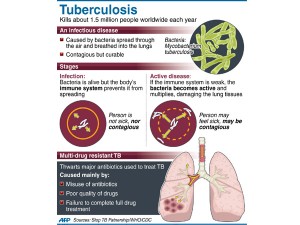TB stalks Filipinos in California county
OAKLAND–While tuberculosis rates in the United States continue to fall, the disease still disproportionately infects Filipinos in one county in Northern California and possibly in other localities with high concentrations of Filipinos, a recent health survey revealed.
One third of 328 Filipinos, ages 18 to 84, surveyed in Union City in Alameda County were latent tuberculosis carriers, but only half received treatment. There is, therefore, a large pool of carriers of latent TB who could infect U.S.-born Filipinos in the future.
With Filipinos comprising 20 percent of Union City’s residents, the study’s findings could reflect other cities in California with high Filipino concentrations. The survey took one year of painstaking community dialogues at workplaces, strip malls, libraries, churches and homes as well as a comprehensive and confidential health questionnaire.
The survey bolsters another finding by the Alameda County Public Health Department that between 2009 and 2011 Asian/Pacific Islanders had the highest average annual TB case rates in the county. It was conducted by the Filipino Advocacy and Organizing for Health Project, a joint effort of Asian Health Services (AHS) and Filipino Advocates for Justice (FAJ) in order to identify the priority health concerns of Filipinos in Union City, in Alameda County. Funding came from the Tides Foundation Community Clinics.
TB cases among Filipinos
Over the past two decades, Filipinos made up 18.3 percent of tuberculosis cases among Asians and Pacific Islanders in Alameda County in the San Francisco Bay Area. Ironically, TB is no longer the number-two killer in the Philippines, where poverty, poor access to care and other social factors, made TB infection widespread.
Filipinos carry TB latency whenever they travel, immigrate or settle abroad. This was demonstrated clearly in 2009 when a cluster of cases among Filipinos along the Hayward-Union City-Fremont corridor accounted for a spike in TB cases in Alameda County.
Physician Assistant Christine Araneta Ignacio at AHS, the director of the joint project, notes that a popular misconception is that the disease mostly comes from recently arrived new immigrants.
“Actually most cases comes from longtime immigrants who have been infected or have had latent TB for many years,” Ignacio explains. “As their health declines, the TB infection is reactivated, they become symptomatic and pass the disease on to other members of the family.”
“Latent TB could be easily treated, but lack of awareness about screening and treatment hamper the eradication of this curable medical problem,” Ignacio points out. She also notes the stigma attached to the disease–that it primarily affects the poor, those who originated from rural areas in the Philippines–and fear of discrimination add to the difficulty in making Filipinos admit to their latent TB infection.
Other health problems
The Asian Health Services-Filipino Advocates for Justice study also confirmed that the most common ailments of Filipinos in Union City are hypertension, high cholesterol and diabetes, consistent with nationwide and statewide health surveys.
Half of the participants were overweight to obese, lack exercise and eat diet high in saturated fat and sodium, factors that contribute to making Filipinos unhealthy. The study further revealed that participants “ages 18-39 and those 65 and over had a 14.5% reported rate of asthma.” This corresponds with a study done in California middle and high schools that found “Filipino adolescents had the highest lifetime prevalence rate of asthma among Asian Americans (23.3%).”
Barriers to becoming healthier
Besides leading a unhealthy lifestyle, an alarming low number of respondents went for routine and recommended health screenings even while 80 percent of them had medical insurance coverage.
The report found that “75% of women ages 18 to 24 never had a pap smear; less than half of men over the age of 40 reported ever having been screened for prostate cancer; only 60% of respondents over the age of 50 received some form of colorectal cancer screening.”
Another factor that is keeping Filipinos from taking full advantage of the medical system is language. Although many new immigrants say they know how to speak English, the reality is that they are less proficient speaking it, thus affecting their ability to communicate well with their doctor, the survey found. “Actually, whenever patients at AHS claim English proficiency are offered English translators during consultations, they immediately express relief and gratitude for this service,” Ignacio says.
Financial hardships worsened by pressures to send money to family back home and stresses from job, family and schools, as well as lack of insurance coverage also contribute to neglecting health as one of the priorities in their lives.
Mental health is an important corollary to physical wellbeing, but seeking mental health care carries a lot of stigma in the Filipino community. Instead of turning to the mental health system for help, “75% of respondents preferred to turn to immediate family when troubled or distressed,” according to the study “and 20% preferred to keep their problems to themselves. A majority of respondents were Catholic and sought support through prayer (90%), even though they did not think of themselves as particularly religious.”
Ignacio hopes that their study would be replicated in other areas especially since Filipinos are now the biggest Asian group in California. “We want to share our community-based research with other cities so that we could all get a bigger sampling and draw more meaningful conclusions,” she says.















